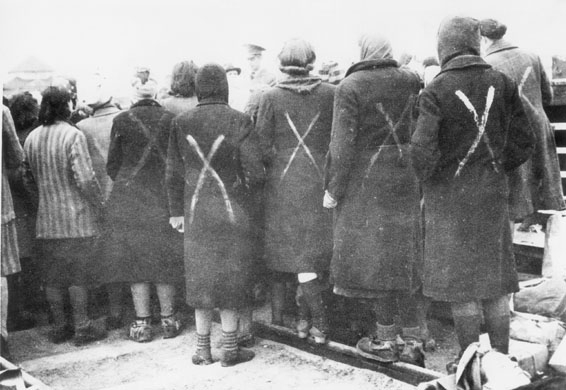English: Females prisoners in the...
en:Ravensbrück concentration camp, the chalk mark on their back show that they have been selected for transport by the Swedish Red Cross Buses in Germany during the end of World War II
en:White Buses.
NOTE! The white crosses mark that the women are prisoners and not that they are selected; in 1943/44 the fabric for prison uniforms ran out, women were then given "civilian" clothes that SS collected from executed prisoners. The clothes were painted with a white cross to mark the prisoner-status and prevent escape.
Margarete Buber-Neumann write in her book
Under Two Dictators. Prisoner of Stalin and Hitler: "SS had no fabric for the production of new prison clothing. Instead they drove truckloads of coats, dresses, underwear and shoes that had once belonged to those gassed in the east, to Ravensbrück. / ... / The clothes of the murded people were sorted, and at first crosses were cut out, and fabric of another color sewn underneath. The prisoners walked around like sheeps marked for slaughter. The crosses would impede escape. Later they spared themselves this cumbersome procedure and painted with oil paint broad, white crosses on the coats." (translated from the Swedish edition: Margarete Buber-Neumann
Fånge hos Hitler och Stalin, Stockholm, Natur & kultur, 1948. Page 176) The photo depicts women prisoners gathered when the Red Cross arrive to Ravensbrück in April 1945.

